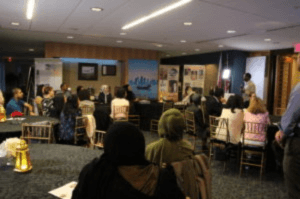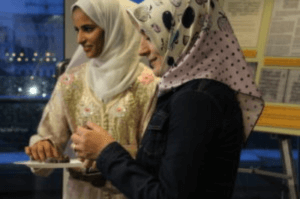QAI Celebrates First Day of Ramadan with Iftar Honoring History of Islam in America
On the evening of May 17, QAI celebrated the first day of the holy month of Ramadan with friends and members of the local community by hosting the first in a series of iftars to take place during the month. This inaugural iftar not only commemorated the beginning of Ramadan, but also focused on the history and traditions of Islam in the United States since the nation’s founding.

An iftar, which means “the breaking of the fast” in Arabic, is the meal eaten after sundown by observant Muslims who had been fasting during daylight hours. After the Maghrib prayer, the fast is traditionally broken by eating a date before feasting upon a selection of foods and drinks, some traditionally linked to the holiday.
QAI’s first iftar celebration, “Ramadan, Islam, & America,” was led by Amir Mohammad, CEO and curator of the American Islamic Heritage Museum, an institution “dedicated to preserving and fostering educational community engagement programs and opportunities that provide access to, and understanding of, the history of Muslim Americans.” Mr. Mohammad provided a brief but fascinating overview of the history of Islam in America, from Thomas Jefferson’s personal copy of the Qu’ran, to famous Muslim Americans, to the number of towns named “Mahomet” in the United States. After his remarks, Mr. Mohammad sang a short azan, or call to prayer, before guests left to pray. Dates were then passed out, a traditional method of breaking the fast in emulation of the Prophet Mohammad (PBUH), followed by a full spread of Middle Eastern dishes. Some of the dishes served were traditional to Ramadan, like harira soup or luqaimat for dessert. For an added personal touch, machboos, a popular Qatari dish, was also served.

QAI believes these iftars are an excellent opportunity for community to come together to celebrate and share in one’s culture and to learn about traditions and heritage in an open and comfortable setting. While the next planned iftars will each have a different theme, the intent behind them remains the same: exploring how connection can be attained through sharing in the cultural richness of others.

